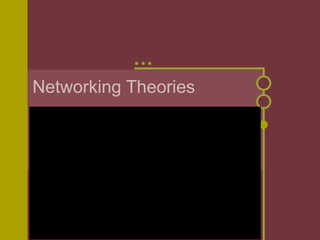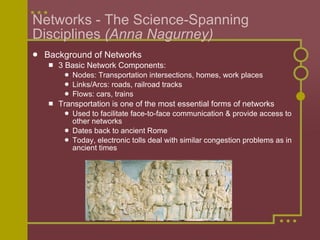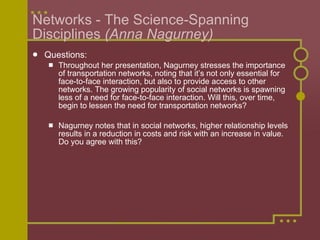Networking Theories Presentation
- 1. Networking Theories Nagurney, Lovink, & Galloway & Thacker
- 2. Networks - The Science-Spanning Disciplines (Anna Nagurney) Background of Networks 3 Basic Network Components: Nodes: Transportation intersections, homes, work places Links/Arcs: roads, railroad tracks Flows: cars, trains Transportation is one of the most essential forms of networks Used to facilitate face-to-face communication & provide access to other networks Dates back to ancient Rome Today, electronic tolls deal with similar congestion problems as in ancient times
- 3. Networks - The Science-Spanning Disciplines (Anna Nagurney) The Study of Networks Scientific approach seeks to determine patterns within networks Studying networks involves: Forming applications as mathematical units Studying models from an quantitative perspective Creating algorithms to solve the ensuing model Seeks to find & study networks where they go unnoticed Energy Online The studying of networks has elicited 3 classic problems: The Shortest Path Problems Moving flows in the most efficient way from an origin to 1+ destinations Examples: Transportation, telecommunications, minimizing storage needed for books in a library The Maximum Flow Problem Figuring out the capacity of the network Examples: Network reliability testing, building evacuation The Minimum Cost Flow Problem Finding the flow pattern that minimizes the total cost without exceeding capacity Examples: warehousing and distribution, biology, finance
- 4. Networks - The Science-Spanning Disciplines (Anna Nagurney) Characteristics of Networks Congestion has become a larger & larger problem through the years Behavior of users is important to consider Individuals vs. the group Can lead to alternative behaviors and paradoxes Braess Paradox Adding additional links/arcs to a network can sometimes reduce the overall performance of the network when the flows individually choose their route Mainly an observation of car traffic behavior, but also relevant to telecommunications and Internet networks since they are non-cooperative networks Highlights the cost to society concerning user optimization vs. system optimization Decisions surrounding networks can impact how a network is used Example: WhereŌĆÖs the best place to locate a nuclear plant?
- 5. Networks - The Science-Spanning Disciplines (Anna Nagurney) The Supernetwork Can be connected, multilevel, or multi-criteria Important to study how people interact with these networks What tools are used for decision-making? What happens when multiple decision-makers attempt to make certain choices? Important to study both the individual and the collective Tools for studying supernetworks: Network Theory Optimization Theory Game Theory Variational Inequality Projected Dynamical Systems Theory Network Visualization Tools
- 6. Networks - The Science-Spanning Disciplines (Anna Nagurney) The Supernetwork Common Applications: Telecommuting/commuting decision-making Teleshopping/shopping decision-making Supply chain networks with electronic commerce Financial networks with electronic transactions Reverse supply chains with e-cycling Knowledge networks Energy networks/power grids Supernetworks can integrate social networks by examining types of relationships Becomes the ŌĆ£flowsŌĆØ With higher relationship levels, comes: Reduction in costs Reduction of risks Increase in value Idea of social responsibility A dynamic, ever-changing network
- 7. Networks - The Science-Spanning Disciplines (Anna Nagurney) Questions: Throughout her presentation, Nagurney stresses the importance of transportation networks, noting that itŌĆÖs not only essential for face-to-face interaction, but also to provide access to other networks. The growing popularity of social networks is spawning less of a need for face-to-face interaction. Will this, over time, begin to lessen the need for transportation networks? Nagurney notes that in social networks, higher relationship levels results in a reduction in costs and risk with an increase in value. Do you agree with this?
- 8. The Principle of Notworking (Geert Lovink) Important to analyze culture as a resource , rather than a commodity ŌĆ£ The culture of the Internet is at handŌĆØ Important to recognize the user over the system The Internet is constantly changing, in ŌĆ£a permanent fluxŌĆØ Experts are still having trouble recognizing this Still see the Internet as a commodity Important to study how users interact with the Internet, but current research is insufficient New media needs a language of its own thatŌĆÖs not so reliant on science The scientific approach has led to the lack of considering outsider viewpoints Networks are, ŌĆ£complex techno-social environments that defy simplistic reductionsŌĆØ
- 9. The Principle of Notworking (Geert Lovink) A networkŌĆÖs focus is on the inside, with ŌĆ£creativity, communication, and self-organized cooperationŌĆØ as its main values Search engines and browsers are not necessarily neutral tools Rather they have certain built-in plans New media enthusiasts must help mediate how theyŌĆÖre used But while networks can be used to foster creativity & cooperation, they are also used to control Protocol Theory Gilles DeleuzeŌĆÖs ŌĆ£control societyŌĆØ idea ŌĆ£ NotworkingŌĆØ is an important aspect of todayŌĆÖs networks Elements in yesterdayŌĆÖs networks that go awry help shape todayŌĆÖs networks Spam, viruses stem from the ŌĆ£frustrated mindŌĆØ
- 10. The Principle of Notworking (Geert Lovink) Questions: Lovink explains that the commercial attempts during the dotcom era to, ŌĆ£validate online communication as ŌĆśvalue,ŌĆÖ measured in ŌĆśpage viewsŌĆÖŌĆØ was ŌĆ£wrong.ŌĆØ Do you think this is continuing today with social networks? Is it the wrong way to measure websites? Do you agree with Lovink that, ŌĆ£research into net cultures entails more than the study of ŌĆśvirtual communitie,ŌĆÖŌĆØ or do agree with NagurneyŌĆÖs more scientific way of studying networks? Do you think the culturization of the Internet is at hand? Is Lovinks notion of ŌĆ£notworkingŌĆØ what makes up todayŌĆÖs networking?
- 11. Review of The Exploit: A Theory of Networks Review 1: Daniel Gilfillan Commends Galloway & Thacker for presenting a contemporary understanding of networks Networks are used to control DeleuzeŌĆÖs idea of ŌĆ£control societiesŌĆØ & ŌĆ£dataveillanceŌĆØ Not necessarily a personŌĆÖs physically visible movements that networks want to track, but their, ŌĆ£patterns in consumer purchases, telecommunications usage, and network access protocolsŌĆØ Used to monetize online networking relationships, rather than promoting its surrounding culture Concept of pushing past the systems of control Take advantage of openings within it to lead to something new and progressive ŌĆ£ FlawsŌĆØ within networks make this progressive change possible A new type of asymmetry is needed for this to take advantage of inconsistencies within a network ŌĆ£ AntiwebŌĆØ and ŌĆ£an exceptional topologyŌĆØ Need both hierarchal systems of control & a decentralized system of distribution
- 12. Review of The Exploit: A Theory of Networks Exploitation of these flaws are possible through: Vector: a medium where an action or motion can take place Flaw: weaknesses within the network, enabling the exposure of the vector Transgression: The ŌĆ£exploitŌĆØ then creates a change within the ontology of the network, making the ŌĆ£failureŌĆØ of the network an alteration in its topology Looking at the ŌĆ£unhumanŌĆØ factors in networks can help facilitate this progressive change ŌĆ£ It will be sculpted into something better, something in closer agreement with the real wants and desires of its users.ŌĆØ (-G&T)
- 13. Review of The Exploit: A Theory of Networks Review 2: Nathaniel Tkacz ŌĆ£ Protocol is a set of rules or codes that enables, modulates, and governs a specific network and also a general logic of governance for all networks.ŌĆØ A form of control & way of directing information Compares to the Panopticon in FoucaultŌĆÖs disciplinary society But, also allows for the exploitation of the flaws within it ŌĆ£ Protological struggles,ŌĆØ emerge that entail, ŌĆ£discovering holes in existing technologies and projecting potential change through these holesŌĆØ The bookŌĆÖs limitations: Its structuring as a network left points not fully developed Relies too heavily on the ŌĆ£old centralized/decentralized dichotomyŌĆØ DidnŌĆÖt hold firm to concept that networks can take numerous forms Confusion concerning what is (not) a network Found the idea behind the authorsŌĆÖ protocol/exploit argument less persuasive as it moved from the specific points to the more general
- 14. Review of The Exploit: A Theory of Networks Author Response: Alexander R. Galloway & Eugene Thacker Key point in book: ŌĆ£ the uncannily anonymous, network tactics demonstrated by ŌĆśpliant and vigorous nonhuman actors.ŌĆÖŌĆØ Networks as beyond human, post-human Viruses donŌĆÖt thrive because the network is ŌĆ£down,ŌĆØ but because of the very fact that theyŌĆÖre working as they should be The authorsŌĆÖ use of Foucault & Deleuze go beyond what was mentioned by the 2 reviewers Looked to build upon FoucaultŌĆÖs work in biopolitics and security (not discipline-surveillance) Not just looking at DeleuzeŌĆÖs ŌĆ£control societyŌĆØ idea, but how this connected to his interest in immanence and univocity
- 15. Review of The Exploit: A Theory of Networks End with 2 overarching questions: What should be done concerning networks? ŌĆ£Should we as humans learn to be more like nonhumans?ŌĆØ 3 possible responses: ŌĆ£ŌĆÖ Master of the universeŌĆÖ attitudeŌĆØ: Exploits, such as viruses, must be eliminated Agnostic: Acceptance that the world is at the mercy of technology Optimistic: Superficially dry and lifeless world, emergent and new at core ŌĆ£ Can there be an ontology of networks?ŌĆØ Must there always be an outside mediator to the network? Can a network topology express itself from within?
- 16. Review of The Exploit: A Theory of Networks Questions: Do you think there can be an ontology of networks? Do you agree with any particular one of the philosophical answers Galloway & Thacker give for their question of, ŌĆ£what should be done?ŌĆØ What other answers could be considered? Even though Galloway & Thacker explain that they werenŌĆÖt looking to build upon FoucaultŌĆÖs concept of the discipline-surveillance and the Panopticon, as Tkacz mentioned in his review, do you still think it can relate to the ŌĆ£control societyŌĆØ nature of networks?















